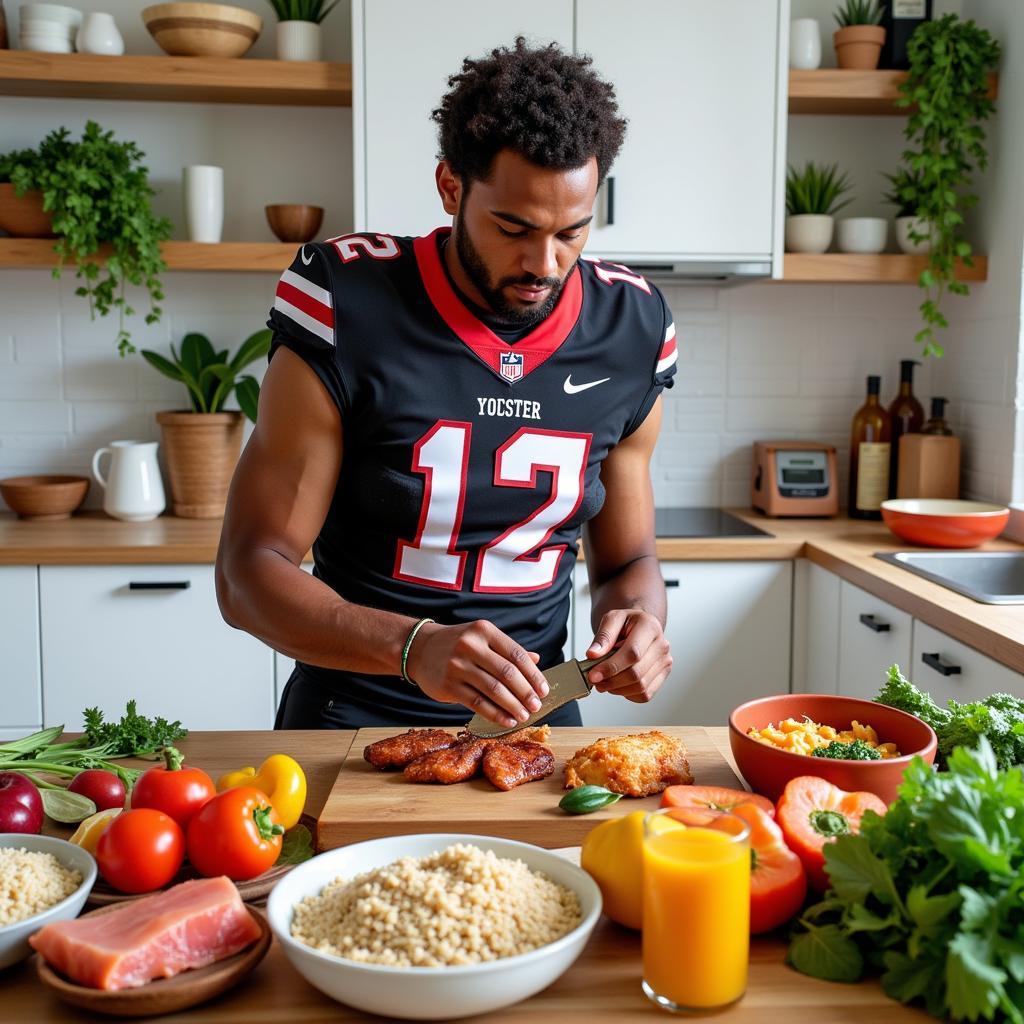Football Players’ Diet: Fueling Peak Performance
November 14, 2024As a professional footballer, I know that diet plays a crucial role in my performance on the pitch. Football players’ diet isn’t just about eating healthy; it’s about fueling your body for intense training, rapid recovery, and maintaining peak physical condition throughout a demanding season. So, what exactly does a winning football players’ diet look like? Let’s delve into the specifics.
What Fuels a Footballer? Key Components of a Winning Football Players’ Diet
A successful football player’s diet focuses on providing the right balance of macronutrients – carbohydrates, proteins, and fats – alongside essential micronutrients and hydration. Each component plays a vital role in optimizing energy levels, muscle repair, and overall health.
Carbohydrates: The Engine Room
Carbohydrates are the primary source of energy for footballers. They are crucial for fueling high-intensity runs, tackles, and those powerful shots on goal. Complex carbohydrates, found in foods like whole grains, brown rice, and sweet potatoes, release energy slowly, providing sustained fuel throughout a match.
What are the best sources of carbohydrates for footballers? Opt for whole grains, fruits, and vegetables. These provide sustained energy release, unlike simple sugars which can lead to energy crashes.
Protein: Building and Repairing Muscle
Protein is essential for muscle growth and repair, crucial for footballers who undergo intense training sessions and matches. Lean protein sources, such as chicken, fish, lean beef, eggs, and beans, are ideal for maximizing muscle recovery and building strength.
How much protein does a football player need? The exact amount varies, but generally, a higher protein intake than the average person is recommended to support muscle repair and growth.
Fats: Not All Fats Are Created Equal
Healthy fats are essential for hormone production, cell function, and nutrient absorption. Include sources of healthy fats, such as avocados, nuts, seeds, and olive oil, in your diet. Avoid processed foods and trans fats.
Why are healthy fats important for football players? They play a key role in reducing inflammation and promoting overall health, contributing to long-term performance and injury prevention.
 Football Player Meal Preparation
Football Player Meal Preparation
Hydration: The Often Overlooked Essential
Proper hydration is crucial for optimal performance. Dehydration can lead to fatigue, muscle cramps, and decreased cognitive function. Drink plenty of water throughout the day, especially before, during, and after training and matches. Electrolyte drinks can be beneficial during intense sessions to replenish lost salts.
What’s the best way to stay hydrated? Carry a water bottle with you at all times and sip regularly throughout the day. Listen to your body and increase fluid intake during hot weather or intense training.
Pre-Match Fuel: Setting the Stage for Success
A pre-match meal should be rich in carbohydrates, moderate in protein, and low in fat. This provides sustained energy without causing digestive discomfort. A good example would be pasta with grilled chicken and vegetables. Timing is key; aim to eat your pre-match meal 2-3 hours before kick-off.
What should you avoid before a match? Stay away from fatty and greasy foods, as they can slow digestion and lead to sluggishness on the field.
Post-Match Recovery: Rebuilding and Refueling
After an intense match, your body needs to replenish glycogen stores and repair muscle tissue. A post-match meal or snack should include carbohydrates and protein. A protein shake with fruit or a chicken sandwich with whole-wheat bread are excellent choices.
Why is post-match nutrition so important? It replenishes lost nutrients and kickstarts the recovery process, allowing you to bounce back faster and be ready for the next training session or match.
Conclusion: Fueling Your Football Journey
A well-planned football player’s diet is the foundation for peak performance. By focusing on the right balance of macronutrients, staying hydrated, and tailoring your meals to your training and match schedule, you can optimize your energy levels, support muscle recovery, and achieve your full potential on the pitch. Remember, a winning diet is just as important as a winning strategy.
FAQs
- What should a football player eat for breakfast? Oatmeal with fruit and nuts is a great option.
- Can football players eat fast food? It’s best to avoid it due to its high fat and low nutrient content.
- How important is hydration for footballers? Essential, as dehydration can significantly impair performance.
- What’s a good pre-match snack? A banana or some rice cakes can provide a quick energy boost.
- When should a football player eat their last meal before a game? Ideally, 2-3 hours before kick-off.
- What are some good sources of protein for football players? Chicken, fish, lean beef, and eggs are all excellent choices.
- How can I learn more about trends in attacking for FO3 players? Check out xu hướng tấn công của cầu thủ fo3.
More Questions? Need more information about player names in particular? Consider checking out names of messi.
Need support? Contact us 24/7: Phone: 0396443476, Email: [email protected], or visit us at 23 Tháng 3, Đắk Nia, Gia Nghĩa, Đắk Nông, Việt Nam.